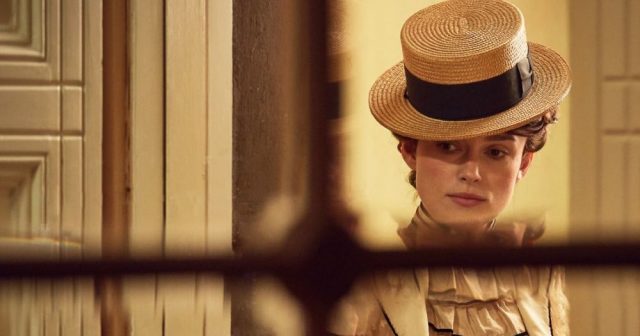Colette: Ripening Seed, by David Bax
In Wash Westmoreland’s Colette, Dominic West plays a theatre critic (actually, he plays a charlatan but one of the things his character fakes well is theatre criticism). He observes that, while you can put down a boring book or look away from a garish painting, “bad theatre is like dentistry,” in that you’re obligated to remain seated through the whole procedure. It’s a bold move for Westmoreland to make, openly inviting the same critique of his own film, a costume drama, no less (a genre that’s earned more than its fair share of complaints about boredom). But such is the strength of Westmoreland’s confidence, a sure hand that, along with two terrific lead performances, shines through every frame of Colette.
Westmoreland’s last movie was Still Alice, the final film he directed with his creative and romantic partner Richard Glatzer. It’s tragic that Glatzer wasn’t around for Colette but Westmoreland seems to be carrying on in the classical yet daring mode they had established as a duo. This time, Keira Knightley stars as Sidonie-Gabrielle Colette, a novelist (among other pursuits) of the belle epoque. West plays her husband, who goes by the nom de plume “Willy” and makes his living publishing the writings of others under his own name. That’s how Colette’s works start, as well, before the eventual divorce and lawsuit that would earn her recognition as the author of some of the most popular books of the era.
As alluded to, Westmoreland’s aesthetic approach is a classical one. With the exception of a theatrical performance framed as a kind of direct address, the lensing of Colette refrains from pushing any boundaries. And yet Westmoreland fills these familiar shots with a melange of vibrantly colored costumes, delectable production design and other things to catch the eye, such as an adorable black French bulldog with a recurring role.
Colette’s story carries weight in our present day and not just in a feminist sense (though more on that later). Her novels, romans à clef about a surrogate character named Claudine, become so wildly popular that they create leagues of devoted fans, many of whom, in a recurring joke, introduce themselves as “the real Claudine.” An obsessive level of fandom is nothing unique in the Twitter age but, Westmoreland suggest, the technology didn’t create it. Parasocial relationships to popular art are a part of human culture and have been for as long as mass media has existed. At the same time, these levels of production have also allowed for art to be commodified and merchandised (in Colette, women take to washing with “Claudine”-branded soap, just one of many products to which Willy and Colette license the name). It’s always been true that artists, having given life to the things they create, also get life back from them. Colette suggests that this symbiotic relationship is no less valid for being as financial as it is spiritual.
Also connecting past to present is Colette’s (and Colette‘s) sexuality. As with last year’s Professor Marston and the Wonder Women, Westmoreland seeks to connect past to present and future by reminding us that conventional sexual mores have always been negotiable in the right circumstances. Colette has dalliances with other women with Willy’s full consent. Yet he stops at signing off on her having a sexual relationship with a man until that man happens to be trans (not the term that’s used in the movie, of course; the best the people of the time can come up with is that the character “wears trousers”).
Which brings us back to Colette‘s place in our ongoing present day conversation about feminism and female identity. There’s an intentional irony to Colette’s declarations of “I want to be part of things” and “I want to know what’s going on.” These meager demands, the movie realizes, are no longer sufficient to qualify as progressive. Colette quickly moves past the bright-eyed and blooming caricature of the happy movie feminist. Before long, she’s no longer asking to be an equal, she’s demanding it. Knightley plays Colette as the most self-possessed, coolest girl in town. That kind of confidence is the least we ought to expect of women from this point on.





























